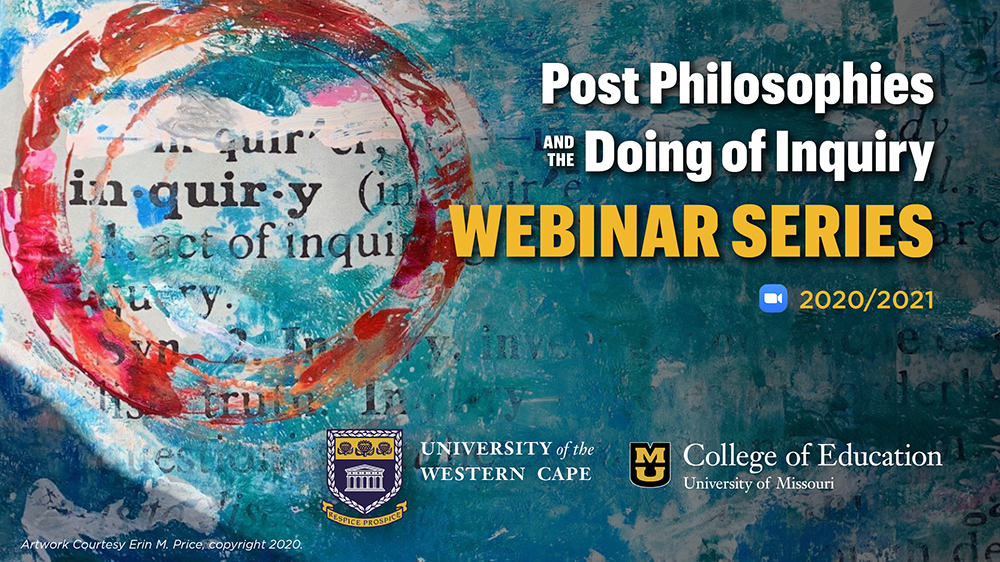
Post Philosophies and the Doing of Inquiry Webinar Series
Hosted by
- Dr. Vivienne Bozalek, University of the Western Cape, South Africa
- Dr. Candace Kuby, University of Missouri, USA
This free webinar series is a year-long virtual space on Zoom that meets monthly on the topic of post qualitative inquiry and the doing of inquiry inspired by a range of post philosophies. Each session involves one or two international guests who have experience with inquiry approaches inspired by post philosophies such as posthumanism, poststructuralism, affect theories, feminist ‘new’ materialism, and postcolonialism.
Content
Each panelist will discuss the following:
- How does your philosophical approach influence your ways of doing inquiry?
- What does this philosophical approach make thinkable or possible for inquiry? (so how does your approach relate to more traditional practices such as literature reviews, data collection, analysis, and so forth)
- What are your perspectives on methodology(ies) and/or methods? How do you envision that in your approaches to doing inquiry?
- What mechanisms could be put in place at universities to help supervisors and/or committees support students doing post philosophy inspired ways of inquiring?
Invited guest speakers will discuss the philosophical approaches which underpin their practice and what this makes possible for doing inquiry, their perspectives on methodologies and ideas for assisting supervisors and students to engage in these kinds of research. The invited panelists also suggest several readings for webinar attendees to read prior to the webinar, although not required (see list of readings).
Webinars
- Webinars are on the third Thursday of the month (unless otherwise noted)
- 1 ½ hour duration with hosts interviewing the panelist(s) then time for questions from attendees
- Zoom links will be added throughout the year
We invite faculty members and students to join this online learning space. Our goal is to record and make publicly available the webinars with permission from panelists. Please see detailed information below.
Previously recorded webinars
You can access past recordings of webinars on the Post Philosophies and the Doing of Inquiry youtube channel. Subscribe to the channel to get updates when new recordings are posted.
Partnership
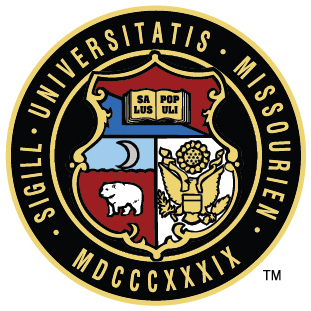
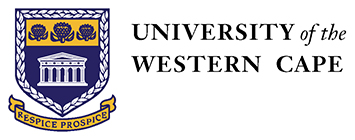
This webinar series is made possible by a collaborative partnership between the University of Missouri System and the University of the Western Cape (UWC) in Cape Town, South Africa, starting in 1986. Funding is provided through the University of Missouri South African Education Program (UMSAEP) Committee, which supports academic exchanges between the MU and UWC and provides opportunities for teaching and learning, research, and community engagement between the two universities.
Contact
If you have questions about the webinar series, accessing the Zoom webinar link, and/or need assistance in accessing the suggested readings, please email Erin Price at erin.price@mail.missouri.edu.
Invited Speakers and Suggested Readings
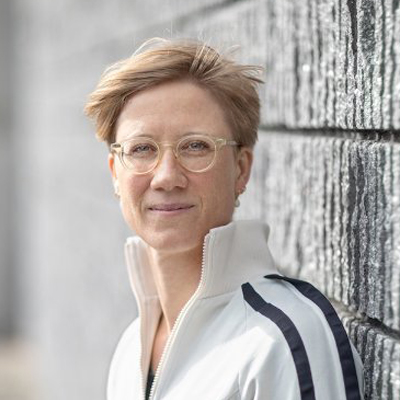
August 20, 2020 • Iris van der Tuin
9:30 am Central Standard Time in the U.S., 4:30pm Cape Town, SA time zones
Professor of Theory of Cultural Inquiry and Director of the School of Liberal Arts, Utrecht University
Zoom Webinar Link: https://umsystem.zoom.us/j/95261824882
Suggested Readings:
- Iris van der Tuin (2019). ‘On Research “Worthy of the Present’. SFU [Simon Fraser University] Educational Review 12.1: 8-20. Special issue Performative and Relational Ontologies in Education. Ed. J. Barreiro.
- Iris van der Tuin (2018). ‘Resourceful: Critique and Creativity in Cultural Inquiry.’ Inaugural lecture at Utrecht University. December 6.
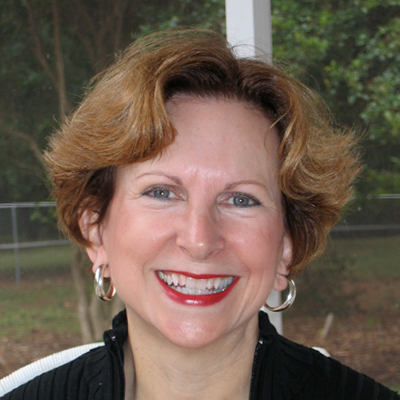
September 17, 2020 • Elizabeth St. Pierre
9:30 am Central Standard Time in the U.S., 4:30pm Cape Town, SA time zones
Professor of Critical Studies in the Educational Theory and Practice Department and Affiliated Professor of both the Interdisciplinary Qualitative Research Program and the Institute of Women’s Studies at the University of Georgia
Zoom Webinar Link: https://umsystem.zoom.us/j/96126098723
Suggested Readings:
- St. Pierre, E.A. (published online June 2020). Why post qualitative inquiry? Qualitative Inquiry.
- St. Pierre, E.A., Jackson, A.Y. & Mazzei, L. (2016). New empiricisms and new materialisms: Conditions for new inquiry. Cultural Studies-Critical Methodologies, 16(2), 99-110.
- St. Pierre, E.A. (2016). Curriculum for new material, new empirical inquiry. In N. Snaza, D. Sonu, S.E. Truman & Z. Zaliwska (Eds.), Pedagogical matters: New materialisms and curriculum studies (pp. 1-12). New York, NY: Peter Lang
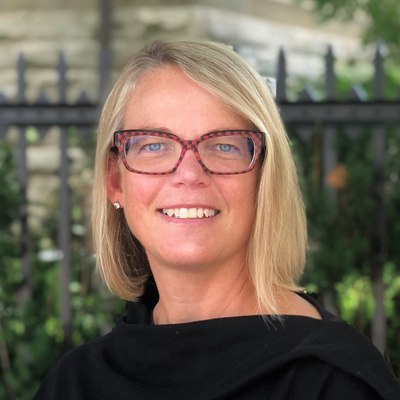
October 15, 2020 • Stephanie Springgay
9:30 am Central Standard Time in the U.S., 4:30pm Cape Town, SA time zones
Director of the School of the Arts and Associate Professor at McMaster University
Zoom Webinar Link: https://umsystem.zoom.us/j/92543661458
Suggested Readings:
- Springgay, S. (2018). ‘How to write as felt’ touching transmaterialities and more-than-human intimacies. Studies in Philosophy and Education, https://doi.org/10.1007/s11217-018-9624-5
- Springgay, S., Truman, A., & MacLean, S. (2019). Socially engaged art, experimental pedagogies, and anarchiving as research-creation. Qualitative Inquiry, DOI: 10.1177/1077800419884964
November 19, 2020 • Alecia Jackson & Lisa Mazzei
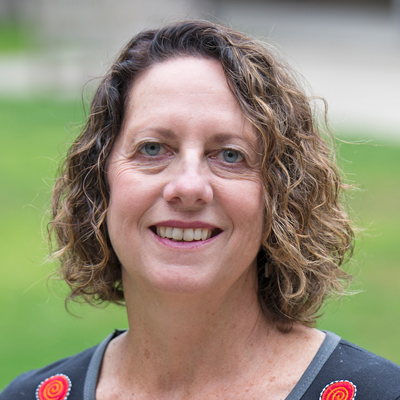
Due to daylight savings time in the U.S. note the updated time: 9:30 am Central Standard Time in the U.S., 5:30pm Cape Town, SA time zones
Lisa A. Mazzei
Professor of Education Studies at the University of Oregon, USA where she also holds a courtesy appointment in the Department of Philosophy
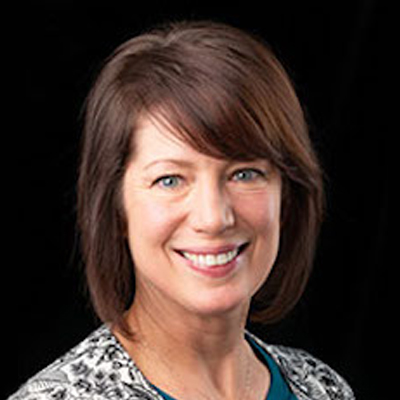
Alecia Jackson
Professor of Educational Research at Appalachian State University in Boone, NC, where she is also affiliated faculty in the Gender, Women’s, and Sexuality Studies program
Zoom Webinar Link: https://umsystem.zoom.us/j/93190842392
Suggested Readings:
- Jackson, A.Y. (2017). Thinking without method. Qualitative Inquiry, 23(9), 666-674.
- Jackson A. Y. & Mazzei, L. A. (2017). Thinking with Theory: A New Analytic for Qualitative Inquiry. In Denzin, N. & Lincoln, Y. (Eds.). The SAGE Handbook of Qualitative Research (5th edition). Sage Publications.
- Mazzei, L. A. (2017). Following the Contour of Concepts. Toward a Minor Inquiry. Qualitative Inquiry, 23(9), 675-685.
Professor, Qualitative Research Program, Research, Evaluation, Measurement, University of Florida

December 17, 2020 • Kakali Bhattacharya
9:30 am Central Standard Time in the U.S., 5:30pm Cape Town, SA time zones
Zoom Webinar Link: https://umsystem.zoom.us/j/96750131488
Suggested Readings:
- Bhattacharya, K. (2020, online first). Rejecting labels and colonization: In exile from post-qualitative approaches. Qualitative Inquiry. DOI: 10.1177/1077800420941049
- Bhattacharya, K. (2019). (Un)Settling imagined lands: a par/des(i) approach to de/colonizing methodologies. In P. Leavy, The Oxford Handbook of Methods for Public Scholarship. DOI:10.1093/oxfordhb/9780190274481.013.36
- Bhattacharya, K. (2018, online first). Nonsense, play, and liminality: Putting postintentionality in dialogue with de/colonizing ontoepistemologies. Qualitative Inquiry. DOI: 10.1177/1077800418819624
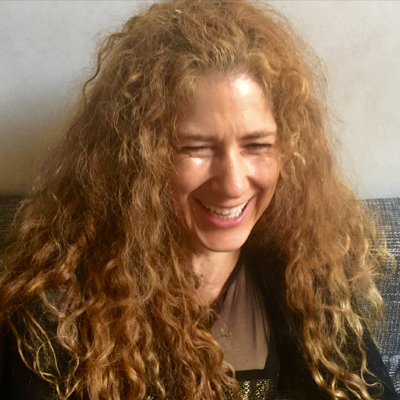
January 21, 2021 • Erin Manning
9:30 am Central Standard Time in the U.S., 5:30pm Cape Town, SA time zones
Research Chair, Speculative Pragmatism, Art, and Pedagogy; Director, Interdisciplinary PhD in the Humanities & Faculty of Fine Arts; and Director, SenseLab at Concordia University
Zoom Webinar Link: https://umsystem.zoom.us/j/98043507159
Suggested Readings:
- Manning, E. (2020). Radical pedagogies and metamodeling of knowledge in the making. Critical Studies in Teaching & Learning (CriSTaL), 8, DOI: 10.14426/cristal.v8iSI.261.
- Manning, E. (2016). Against method. In E. Manning, The minor gesture. Durham, NC: Duke University Press.

February 18, 2021 • Ezekiel Dixon-Román
9:30 am Central Standard Time in the U.S., 5:30pm Cape Town, SA time zones
Associate Professor & Director, MS in Social Policy Program and Chair, Data Analytics for Social Policy Certificate Program, University of Pennsylvania
Zoom Webinar Link: https://umsystem.zoom.us/j/96755646955?pwd=a3hQRUVRelNDREpydnVXdGtDeUhPdz09
Passcode: 907134
Suggested Readings:
- Dixon-Román, E. 2016. Diffractive Possibilities: Cultural Studies and Quantification. Transforming Anthropology 24(2):157-167.
- Dixon-Román, E. 2017. Toward A Hauntology on Data: On The Sociopolitical Forces of Data Assemblages. Research in Education 98(1): 44-58.
- Dixon-Román, E. 2020. A Haunting Logic of Psychometrics: Toward the Speculative and Indeterminacy of Blackness in Measurement. Educational Measurement: Issues and Practice.
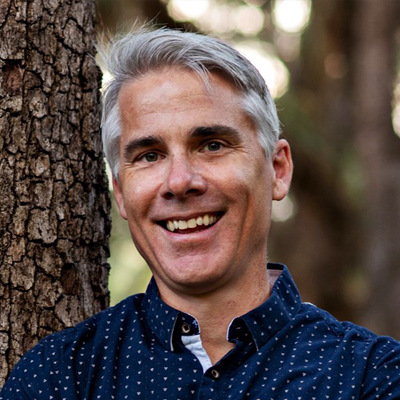
March 18, 2021 • Aaron Kuntz
Due to daylight savings time in the U.S. note the updated time: 9:30 am Central Standard Time in the U.S., 4:30pm Cape Town, SA time zones
Professor and Chair, Counseling, Recreation, and School Psychology, Florida International University
Zoom Webinar Link: https://umsystem.zoom.us/j/96285548209?pwd=VEtRWkxpdjI2aFg1Ly9qa3hjR0EwZz09
Passcode: 648037
Suggested Readings:
- Kuntz, A.M. (2019). Relational inquiry as radical cartography. In A. Kuntz, Qualitative Inquiry, Cartography, and the Promise of Social Change. London: Routledge. pp82-103.
- Kuntz, A.M. (2020). “Piercing This Wall”: Truth-Making in a Fascist World. Qualitative Inquiry. doi.org/10.1177/1077800420934153
- Kuntz, A.M (2020). Standing at one’s post: Post-Qualitative inquiry as Ethical Enactment. Qualitative Inquiry. doi.org/10.1177/1077800420932599
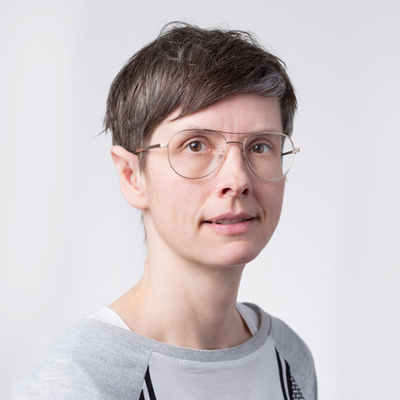
April 15, 2021 • Kathrin Thiele
9:30 am Central Standard Time in the U.S., 4:30pm Cape Town, SA time zones
Associate Professor Gender Studies and Critical Theory at Utrecht University
Terra Critica: Interdisciplinary Network for the Critical Humanities
Zoom Webinar Link: https://umsystem.zoom.us/j/94985493151?pwd=K09hbmpWYy80YVZIRGxvVVRYY2RZZz09
Passcode: 034137
Suggested Readings:
- K.Thiele, M. Górska, & P. Tùrer (2020). “Relation(al) Matters: Vulnerable Pedagogies, Care, and Carriance a (C)air-ful(l)ness in Higher Education.” In: V. Bozalek, M. Zembylas, J. Tronto (eds.), Posthuman and Care Ethics for Reconfiguring Higher Education Pedagogies: North/South Ruptures and Entanglements (London/New York: Routledge, pp. 51-64).
- K. Thiele, (forthcoming/2021). “After Humanism? – Time and Transformation in Critical Thinking.” In: B. Kaiser, K.Thiele, & T. O’Leary (eds.), The Ends of Critique: Methods, Institutions, Politics (London/Lanham: Rowman & Littlefield).
May 20, 2021 • Elizabeth de Freitas & Nathalie Sinclair
9:30 am Central Standard Time in the U.S., 4:30pm Cape Town, SA time zones
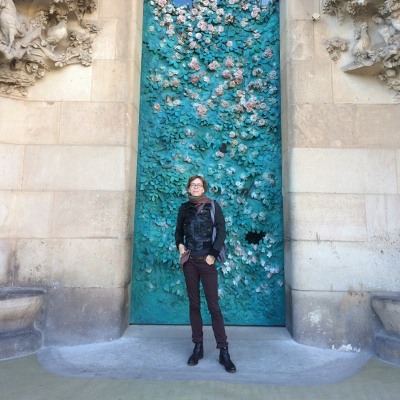
Elizabeth de Freitas
Professor in The Education and Social Research Institute at Manchester Metropolitan University, UK, and professor of mathematics education at Adelphi University, NY

Nathalie Sinclair
A Canada Research Chair in Tangible Mathematics Learning at Simon Fraser University and a Professor in the Faculty of Education
Zoom Webinar Link: https://umsystem.zoom.us/j/92236206702?pwd=Mk5FN3dXOUNYbWRKWTY0M1BHRURUZz09
Passcode: 699494
Suggested Readings:
- de Freitas, E. & Sinclair, N. (forthcoming, 2021). Proportion, analogy and mixture: Unearthing mathematical measurement practices. In T. Ingold (ed.), Knowing from the inside: Cross-disciplinary experiments with matters of pedagogy. Bloomsbury.
- de Freitas, E., & Truman, S. E. (2020). New Empiricisms in the Anthropocene: Thinking With Speculative Fiction About Science and Social Inquiry. Qualitative Inquiry, 1. https://doi.org/10.1177/1077800420943643
- de Freitas, E. & Sinclair, N. (2018). The quantum mind: Alternative ways of reasoning with uncertainty. Can. J. Sci. Math. Techn. Educ. 18, 271–283 https://doi.org/10.1007/s42330-018-0024-1
- de Freitas, E. (2017). The biosocial subject: sensor technologies and worldly sensibility, Discourse: Studies in the Cultural Politics of Education, DOI: 10.1080/01596306.2018.1404199
- de Freitas, E. & Sinclair, N. (2016, July). The biopolitics of number sense: Ordinality and ontology. [Paper Presentation] 13th International Congress on Mathematical Education, Hamburg.
June 17, 2021 • Fikile Nxumalo & Eve Tuck
9:30 am Central Standard Time in the U.S., 4:30pm Cape Town, SA time zones
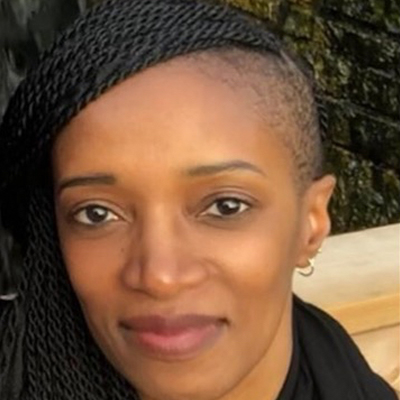
Fikile Nxumalo
Assistant Professor, Department of Curriculum, Teaching and Learning, University of Toronto, Ontario Institute for Studies in Education
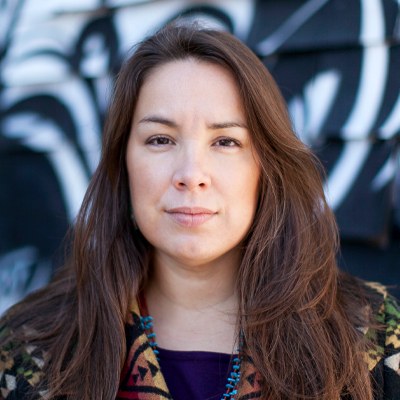
Eve Tuck
Associate Professor, Department of Social Justice Education, University of Toronto, Ontario Institute for Studies in Education
Zoom Webinar Link: https://umsystem.zoom.us/j/97831833067?pwd=STBRMmxxTmZ4MWpScFVsTS95VzhFUT09
Passcode: 112712
Suggested Readings:
- Nxumalo, F.& Villanueva, M.(2019). Decolonial water stories: Affective pedagogies with young children. International Journal of Early Childhood Environmental Education, 7(1),40-56.
- Nxumalo, F. (2018). Situating Indigenous and Black childhoods in the Anthropocene. In A. Cutter-Mackenzie, K. Malone, & E. Barratt Hacking (Eds.), International research handbook on childhoodnature: Assemblages of childhood and nature research (pp. 1-22). New York: Springer. DOI: https://doi.org/10.1007/978-3-319-51949-4_37-2
- Nxumalo, F. & Cedillo, S. (2017). Decolonizing ‘place’ in early childhood studies: Thinking with Indigenous onto-epistemologies and Black feminist geographies. Global Studies of Childhood, 7(2), 99-112.
- Tuck, E. (2009). Suspending damage: A letter to communities. Harvard Educational Review, 79(3), 409–427.
- Tuck, E. and K.W. Yang. (2014). ‘R-Words: Refusing Research’ in D. Paris and M. T. Winn (Eds.) Humanizing Research: Decolonizing Qualitative Inquiry with youth and Communities. Thousand Oakes, CA: Sage Publications.
July 15, 2021 • Sarah E. Truman

Sarah E. Truman
Postdoctoral Research Fellow & Lecturer, Melbourne Graduate School of Education
10 pm Melbourne, Australia, 7 am Central Standard Time in the U.S and 2 pm in Cape Town, South Africa
Zoom Webinar Link: https://umsystem.zoom.us/j/93339679029?pwd=dlJKL0JBTDJ2emgwKzFja0I3VS9jUT09
Passcode: 568253
Suggested Readings:
- Truman, S. (forthcoming). Feminist Speculations and the Practice of Research-Creation: Writing Pedagogies and Intertextual Affects. Routledge.
August 26, 2021 • David Ben Shannon
 David Ben Shannon
David Ben Shannon
PhD student, Education and Social Research Institute (ESRI), Manchester Metropolitan University
David Ben Shannon is a PhD student at Manchester Metropolitan University. His current research explores neurodiversity in the early childhood classroom, and draws from theories of affect, queer theory, and critical disability studies. He is a composer and musician, and is one half of electronica/glitch-folk research-creation music duo Oblique Curiosities. David is currently writing up his PhD thesis, and continues to work as a special education teacher. His pronouns are he/him.
9:30 am Central Standard Time in the U.S., 4:30pm Cape Town, SA time zones
Zoom Webinar Link: https://umsystem.zoom.us/j/98424771061?pwd=Sk8zVmRhd2wyNURKTGtFaXppWTlBdz09
Passcode: 274226
Shannon, D. B. (2021). What do ‘propositions’ do for research-creation? Truth and modality in Whitehead and Wittgenstein. Matter: Journal of New Materialist Research, 2(2), 50–75.
Truman, S. E., & Shannon, D. B. (2018). Queer sonic cultures: An affective walking-composing project. Capacious: Journal for Emerging Affect Inquiry, 1(3), 58–77.
Shannon, D. B. (2020). Neuroqueer(ing) Noise: Beyond ‘mere inclusion’ in a neurodiverse early childhood classroom. Canadian Journal of Disability Studies, 9(5), 489–514.
September 16, 2021 • Maggie MacLure
 Maggie MacLure
Maggie MacLure
Professor Emerita, Education and Social Research Institute (ESRI), Faculty of Health and Education, Manchester Metropolitan University UK.
Until recently Maggie was leader of ESRI’s Theory and Methodology Research Group and co-director (with Liz de Freitas) of the Manifold Lab for biosocial and eco-sensory studies of learning and behaviour. She is founder-director of the international Summer Institute in Qualitative Research. She is currently preoccupied with issues of language, sensation and materiality, and the profound implications of the ‘ontological turn’ for the thinking and doing of applied social and educational research. Her most recent research projects have focused on language and materiality in early childhood.
9:30 am Central Standard Time in the U.S., 4:30pm Cape Town, SA time zones
Zoom Webinar Link: https://umsystem.zoom.us/j/99193617359?pwd=VGt1U3ZhK2NiQjlIcEhGcklocE9Zdz09
Passcode: 188841
Suggested readings:
MacLure, M. (2021) ‘Inquiry as Divination’, Qualitative Inquiry, 27(5), pp. 502–511. doi: 10.1177/1077800420939124. [Open access]
M. MacLure (2017). Qualitative methodology and the new materialisms: “A little of Dionysus’s blood?”. NK. Denzin, MD. Giardina. In: Qualitative Inquiry in Neoliberal Times. Routledge, pp.48-58.
MacLure, M. (2016) ‘The Refrain of the A-Grammatical Child: Finding Another Language in/for Qualitative Research’, Cultural Studies ↔ Critical Methodologies, 16(2), pp. 173–182. doi: 10.1177/1532708616639333
M. MacLure (2013). Researching without representation? Language and materiality in post-qualitative methodology, International Journal of Qualitative Studies in Education, 26:6, 658-667, DOI: 10.1080/09518398.2013.788755